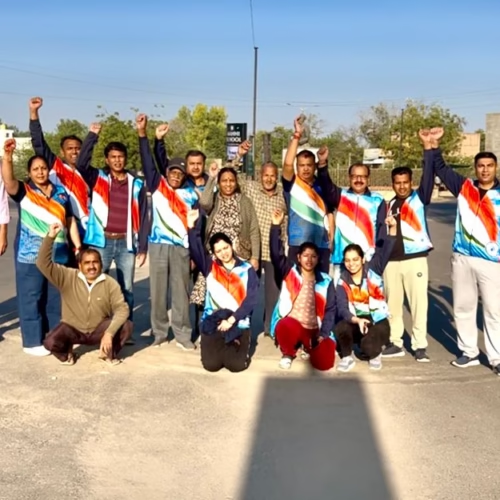Spy Arrested in Jaisalmer: Rajasthan Police Expose ISI Espionage Network Targeting Indian Army
By Defence Journalist Sahil | T.I.N. Network
Jaisalmer, Rajasthan:
In a major breakthrough for national security agencies, the Rajasthan Police Intelligence Wing (CID-Intelligence) has uncovered a dangerous espionage plot along India’s western frontier. On Thursday, officers arrested a 47-year-old man from Jaisalmer district on charges of spying for Pakistan’s Inter-Services Intelligence (ISI).
The accused, identified as Hanif Khan, a resident of Basinpir Juni in Jaisalmer, was allegedly passing sensitive and classified information regarding the Indian Army’s operational movements to handlers across the border in exchange for money. His arrest has exposed once again how Pakistan’s spy network continues to exploit vulnerable individuals in India’s border districts to compromise national security.
The Arrest and Preliminary Findings
Confirming the arrest, Dr. Vishnukant, Inspector General of Police (Intelligence, Rajasthan) stated that the agency had been closely monitoring suspicious activities in the border region. During surveillance, Khan’s unusual communications and financial transactions attracted the attention of investigators. After a prolonged and discreet probe, it became clear that he was engaged in espionage activities detrimental to India’s national security.
CID-Intelligence teams detained Khan and, upon interrogation, discovered that he had been sharing critical details about Army camps, supply depots, and troop movement patterns. For these services, Khan was allegedly receiving financial compensation from across the border, highlighting how greed and exploitation of socio-economic vulnerabilities are being weaponized by ISI in its intelligence-gathering strategy.
Method of Espionage: From Social Media to Ground-Level Access
Unlike conventional spycraft of the past involving coded letters and clandestine meetings, Khan’s activities reveal how Pakistan has modernized its espionage methodology. Investigators discovered that Khan was in touch with his handlers primarily via social media platforms, messaging applications, and Voice over Internet Protocol (VoIP) calls.
His local credibility and easy mobility within Jaisalmer’s border areas made him a valuable asset. He was reportedly tasked with gathering tactical information such as:
- Movement of Army convoys along border roads.
- Layout of base camps and supply depots.
- Patterns of deployment near sensitive locations.
- Updates during military exercises.
While such details might appear minor in isolation, when collated systematically by Pakistan’s intelligence agencies, they could severely compromise India’s strategic posture along the western front.
Shocking Link with “Operation Sindoor”
The most alarming revelation during interrogation was Khan’s alleged involvement in leaking information about “Operation Sindoor,” a classified Indian Army exercise carried out recently in the desert sector.
Investigators suspect Khan remained in touch with his Pakistani handler even during the height of the operation, transmitting updates on troop activities and tactical maneuvers.
Military analysts point out that exposing the code name, scale, and scope of such an operation could have grave consequences. Pakistan, if aware of India’s operational strategies, might have attempted counter-measures, surveillance, or even used the intelligence to fuel propaganda. The breach, therefore, underscores how deeply embedded espionage efforts remain a challenge for Indian security forces.
Digital Forensics and Hard Evidence
CID-Intelligence’s decision to move swiftly was bolstered by digital forensics. Khan’s mobile phone, subjected to technical analysis, yielded irrefutable evidence of his espionage.
Recovered data included:
- Chat transcripts with suspected ISI handlers.
- Screenshots and images of Army locations and vehicle convoys.
- Banking and money transfer records confirming financial inducements.
These findings provided the basis for charging Khan under the Official Secrets Act, 1923, one of India’s most stringent laws designed to safeguard military and national security secrets. If convicted, Khan could face long-term imprisonment.
Growing Pattern: Fourth Espionage Arrest This Year
Authorities revealed that this is the fourth arrest in Jaisalmer district this year linked to ISI espionage activities. This trend has sent shockwaves through the intelligence community, raising concerns about the scale of Pakistan’s penetration into Rajasthan’s border belt.
Sources in Rajasthan Police note that ISI has been aggressively targeting individuals living in economically vulnerable conditions, luring them with promises of money and sometimes exploiting personal weaknesses. Jaisalmer, with its sprawling desert terrain, porous routes, and proximity to Pakistan, offers fertile ground for such infiltration.
The Strategic Threat
India’s western sector, particularly Rajasthan, plays a vital role in the country’s defense matrix. The region houses forward bases, critical logistic depots, and large formations of the Indian Army’s Southern and South-Western Commands. Any leakage of troop movements or operational details can jeopardize not only localized security but also the larger military strategy against Pakistan.
Retired security experts have stressed that while India’s counter-intelligence efforts have improved dramatically over the years, the persistence of such arrests underlines the need for greater vigilance, community awareness, and better socio-economic outreach to ensure locals are not exploited by adversaries.
Government Response and Next Steps
While Rajasthan Police have declined to share operational details beyond the arrest, officials confirmed that central intelligence agencies including the Research and Analysis Wing (RAW) and Military Intelligence (MI) are coordinating to trace Khan’s wider network. Investigators are now probing:
- Whether Khan had accomplices within Rajasthan or other states.
- If additional sensitive information has already reached Pakistan.
- The identity of his ISI handlers and their possible links to previous spy cases.
Given the seriousness of the matter, sources suggest that Khan’s case may soon be transferred to a central investigative agency such as the National Investigation Agency (NIA).
A Recurring Challenge
India’s western borders have historically been plagued by espionage attempts. In recent years, Rajasthan Police and the Intelligence Bureau (IB) have foiled multiple ISI-backed spy modules. Each case has followed a recurring pattern — locals recruited for small sums of money, exploited via online communication, and tasked with seemingly “routine” observations that hold immense value in military intelligence terms.
Hanif Khan’s arrest serves as another reminder that Pakistan’s covert war against India continues in multiple dimensions, from terrorism to espionage. The case also highlights the evolving nature of modern spycraft, where smartphones, social media, and encrypted communications have replaced traditional methods, making detection more challenging.
Conclusion
The arrest of Hanif Khan in Jaisalmer is not an isolated event but part of a larger, ongoing espionage challenge that India faces along its borders. With digital platforms now being used as tools of recruitment and communication, the threat landscape is becoming more complex.
This case demonstrates both the tenacity of ISI in expanding its network and the resilience of Indian intelligence agencies in countering such threats. While the immediate danger has been neutralized with Khan’s arrest, the broader network remains a matter of concern.
For India, maintaining vigilance in border states like Rajasthan is no longer just about securing territory but also about protecting the digital and informational domain that has become the new battlefield of modern espionage.
जैसलमेर से जासूस गिरफ्तार: आईएसआई को बेच रहा था भारतीय सेना की गोपनीय जानकारियां, ‘ऑपरेशन सिंदूर’ से जुड़े तारों ने खोली बड़ी साजिश
BY DEFENCE JOURNALIST SAHIL | T.I.N. NETWORK
राजस्थान की पश्चिमी सीमा, जहां भारतीय सेना की तैनाती और सैन्य गतिविधियां हमेशा से रणनीतिक दृष्टि से बेहद संवेदनशील मानी जाती हैं, वहीं से एक बार फिर देश की सुरक्षा के साथ खिलवाड़ करने वाली चौंकाने वाली घटना सामने आई है। राजस्थान पुलिस की इंटेलिजेंस शाखा (सीआईडी-इंटेलिजेंस) ने जैसलमेर जिले के सीमावर्ती इलाके से एक व्यक्ति को गिरफ्तार किया है, जिस पर पाकिस्तान की खुफिया एजेंसी आईएसआई (ISI) को संवेदनशील सैन्य सूचनाएं बेचने का आरोप है। गिरफ्तार आरोपी की पहचान 47 वर्षीय हनीफ खान, निवासी बासनपीर जुनी, जैसलमेर, के रूप में हुई है।
यह गिरफ्तारी न केवल एक व्यक्ति की गद्दारी की कहानी है, बल्कि पाकिस्तान की खुफिया एजेंसी आईएसआई के उस गहरे नेटवर्क को भी उजागर करती है, जो सीमावर्ती राजस्थान में धीरे-धीरे अपनी जड़ें फैलाकर भारत की सुरक्षा प्रणाली को चुनौती देने की कोशिश कर रहा है।
गिरफ्तारी की पूरी कहानी
सीआईडी-इंटेलिजेंस के महानिरीक्षक डॉ. विष्णुकांत ने प्रेस को बताया कि एजेंसी पिछले कुछ समय से राज्य में जासूसी गतिविधियों पर कड़ी नजर रख रही थी। इसी दौरान हनीफ खान की संदिग्ध गतिविधियों पर निगाह पड़ी। पुलिस की विशेष टीम ने गहन निगरानी, तकनीकी विश्लेषण और लंबी जांच के बाद पाया कि हनीफ पाकिस्तानी खुफिया एजेंसी के संपर्क में है और पैसे के लालच में भारतीय सेना से जुड़ी गोपनीय सूचनाएं साझा कर रहा है।
गुरुवार को कार्रवाई करते हुए सीआईडी इंटेलिजेंस ने उसे गिरफ्तार कर लिया। गिरफ्तारी के समय उसके पास से कई डिजिटल सबूत बरामद किए गए हैं, जिनमें मोबाइल फोन से लेकर सोशल मीडिया चैट तक शामिल हैं।
सोशल मीडिया के जरिए जासूसी का नया चेहरा
पुलिस जांच में यह खुलासा हुआ है कि हनीफ खान पारंपरिक तरीकों के बजाय डिजिटल माध्यमों के जरिए पाकिस्तान के हैंडलरों से संपर्क में था। वह सोशल मीडिया प्लेटफॉर्म और इंटरनेट कॉलिंग ऐप्स का इस्तेमाल कर सूचनाओं का आदान-प्रदान करता था।
इस तरीके ने सुरक्षा एजेंसियों को यह सोचने पर मजबूर कर दिया है कि अब जासूसी नेटवर्क किस तरह नई तकनीकों का उपयोग कर भारतीय सुरक्षा ढांचे में सेंध लगाने की कोशिश कर रहे हैं।
हनीफ खान की सीमावर्ती क्षेत्र में आसान आवाजाही और स्थानीय इलाकों की गहरी जानकारी उसके लिए जासूसी का साधन बनी। वह सेना की गतिविधियों, बेस कैंप और डिपो की लोकेशन, यहां तक कि सैनिकों की मूवमेंट तक की जानकारी जुटाता और पाकिस्तानी हैंडलरों तक पहुंचाता था।
‘ऑपरेशन सिंदूर’ की गोपनीयता भंग
सबसे चौंकाने वाला पहलू यह है कि हनीफ खान का जासूसी नेटवर्क हाल ही में चलाए गए भारतीय सेना के एक महत्वपूर्ण सैन्य अभ्यास ‘ऑपरेशन सिंदूर’ से जुड़ा हुआ पाया गया। पुलिस की पूछताछ में सामने आया है कि इस दौरान भी वह लगातार पाकिस्तानी हैंडलर से संपर्क में था और अभ्यास से जुड़ी सूचनाएं भेज रहा था।
किसी भी सैन्य अभ्यास का कोड-नेम, रणनीतिक गतिविधियां और ऑपरेशनल मूवमेंट्स सुरक्षा की दृष्टि से बेहद गोपनीय होते हैं। ऐसे में इस जानकारी का दुश्मन के हाथों में पहुंचना सीधे तौर पर भारतीय सेना की परिचालन क्षमता और राष्ट्रीय सुरक्षा को खतरे में डालने वाला है।
तकनीकी जांच और ठोस सबूत
सीआईडी-इंटेलिजेंस ने आरोपी के मोबाइल फोन की तकनीकी जांच की। जांच में मिले डिजिटल डेटा ने साफ कर दिया कि वह वित्तीय लाभ के लिए देश की रक्षा से जुड़ी गोपनीय जानकारी बेच रहा था।
एजेंसी ने उसके खिलाफ ऑफिशियल सीक्रेट्स एक्ट, 1923 के तहत मुकदमा दर्ज किया है। इस कानून के तहत ऐसे अपराधों के लिए कठोर सजा का प्रावधान है, क्योंकि यह सीधे तौर पर राष्ट्रीय सुरक्षा और सेना की अखंडता से जुड़ा मामला है।
बार-बार जासूसों की गिरफ्तारी और बढ़ता खतरा
सबसे गंभीर पहलू यह है कि यह इस साल जैसलमेर जिले से जासूसी से जुड़ी चौथी गिरफ्तारी है। लगातार हो रही गिरफ्तारियां साफ संकेत देती हैं कि पाकिस्तान की खुफिया एजेंसी आईएसआई पश्चिमी राजस्थान के सीमावर्ती क्षेत्रों में लगातार अपने जाल बिछा रही है।
पैसों का लालच देकर स्थानीय लोगों को अपने जासूसी नेटवर्क का हिस्सा बनाना इस एजेंसी की पुरानी रणनीति है। लेकिन जिस तेजी से हाल के वर्षों में गिरफ्तारियां बढ़ी हैं, वह इस खतरे की गहराई और व्यापकता को दर्शाता है।
राष्ट्रीय सुरक्षा के लिए चुनौती
भारतीय सेना की तैनाती, रणनीति और मूवमेंट्स से जुड़ी सूचनाओं का दुश्मन तक पहुंचना केवल एक छोटे स्तर का अपराध नहीं, बल्कि पूरे देश की सुरक्षा को कमजोर करने का प्रयास है। जैसलमेर, बाड़मेर और बीकानेर जैसे सीमावर्ती जिलों में आईएसआई की बढ़ती सक्रियता इस बात की चेतावनी है कि दुश्मन अब पारंपरिक जंग के बजाय खुफिया और साइबर जंग के जरिए भारत को चुनौती दे रहा है।
एजेंसियों की चुनौती और आने वाला समय
इस गिरफ्तारी ने सुरक्षा एजेंसियों के सामने दो बड़ी चुनौतियां रख दी हैं।
पहली – सीमावर्ती इलाकों में आईएसआई के बढ़ते नेटवर्क को तोड़ना और लोगों को इसके झांसे से बचाना।
दूसरी – डिजिटल माध्यमों का दुरुपयोग रोकना, क्योंकि अब जासूसी केवल रेडियो या कागजी सूचनाओं के आदान-प्रदान तक सीमित नहीं है, बल्कि व्हाट्सऐप, फेसबुक और अन्य सोशल मीडिया प्लेटफॉर्म्स पर भी सक्रिय हो चुकी है।
निष्कर्ष
जैसलमेर से गिरफ्तार हनीफ खान का मामला केवल एक व्यक्ति के अपराध की कहानी नहीं है, बल्कि यह उस बड़े खतरे का संकेत है जो पाकिस्तान की खुफिया एजेंसी आईएसआई भारत की पश्चिमी सीमा पर रच रही है। बार-बार हो रही गिरफ्तारियां इस बात का सबूत हैं कि दुश्मन लगातार सक्रिय है और भारतीय सुरक्षा तंत्र को चुनौती दे रहा है।
इसलिए अब केवल सुरक्षा एजेंसियों को ही नहीं, बल्कि आम नागरिकों को भी जागरूक रहना होगा। क्योंकि जासूसी का यह खेल केवल सीमा पर नहीं, बल्कि हर उस स्थान पर खेला जा रहा है जहां पैसे और लालच के बदले देश की सुरक्षा दांव पर लगाई जा सकती है।













Add Comment